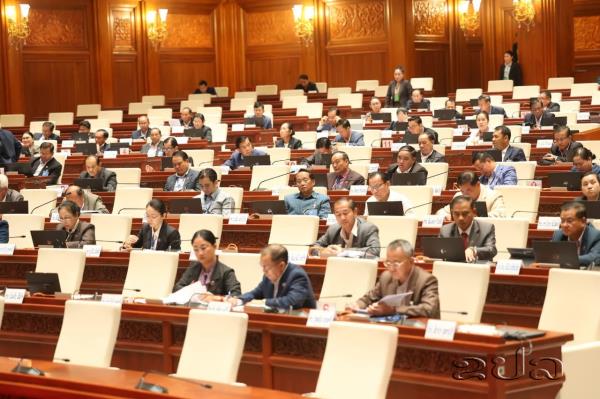KPL
Members of the National Assembly (NA) reviewed and commented on the draft Law on Cybersecurity during the 9th Ordinary Session of the 9th Legislature. The law, proposed by the Minister of Technology and Communications, aims to strengthen national cybersecurity, promote regional and international digital integration, and protect critical information infrastructure and the personal data of service users, on June 23, 2025.

(KPL) Members of the National Assembly (NA) reviewed and commented on the draft Law on Cybersecurity during the 9th Ordinary Session of the 9th Legislature. The law, proposed by the Minister of Technology and Communications, aims to strengthen national cybersecurity, promote regional and international digital integration, and protect critical information infrastructure and the personal data of service users, on June 23, 2025.
NA members, representing the rights and interests of the Lao people, provided feedback to ensure the draft law is complete, clear, and practical for implementation.
Mr. Bounhome Thethany, representative of Xiengkhuang Province (Constituency 9), expressed his appreciation for the comprehensive and foundational nature of the draft law. He emphasized that it is essential for maintaining national security and social order in the digital era. However, he proposed renaming the law to “Law on Security of Information Technology and Communication Systems (Cyber)” to reflect local language and context more appropriately.
Regarding Article 51, which outlines conditions for obtaining a cybersecurity business license, Mr. Bounhome recommended the inclusion of additional requirements related to infrastructure and technical capacity. He noted that businesses must have modern buildings, reliable maintenance, advanced power systems, skilled personnel, and up-to-date equipment to ensure strong cybersecurity defenses.
Mr. Thanongsin Kanlaya, NA member from Constituency 12 of Khammouane Province, highlighted the growing importance of digital connectivity alongside land, water, and air networks. He stressed that ASEAN has identified cybersecurity as a top priority for regional cooperation. Accordingly, he called for stronger protections for national digital systems, as well as targeted investments in capacity-building for cyber defense. He noted that existing IT personnel may be insufficient and recommended developing specialized training programs to fill this gap.
The feedback gathered from this session will help refine the draft to ensure it meets the evolving demands of digital governance, national security, and user protection.
KPL